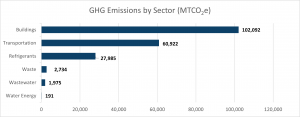Community-Scale Greenhouse Gas and Consumption-Based Emissions Inventory
In 2022, The Town of Sudbury passed Article 58, declaring a climate emergency and setting the Town on a pathway to addressing the local causes and coming impacts of climate change. This included hiring a dedicated Sustainability Director and developing the 2023 Climate Mobilization Plan. To further support these efforts, the Town has completed a Geographic Community-Scale and Consumption-Based Greenhouse Gas (GHG) emissions inventory for 2021 to determine how the community is contributing to climate change and the most effective ways to reduce emissions. As part of the planning process, the Town has completed an analysis of the specific pathways necessary to meet the GHG reduction targets established in Article 58 to reduce GHGs by 50% below 1990 levels by 2030, 75% by 2040, and net zero by 2050.
The greenhouse gas emissions attributable to activities by municipal operations, businesses, and residents in the community for 2021 total 195,899 metric tons CO2 equivalent (MTCO2e). With 102,092 MTCO2e, Buildings account for the highest contributor of GHG emissions by sector. When viewed by source, gasoline is identified as the largest single source of emissions, mostly used by on-road passenger vehicles. The two graphs below further breakdown Sudbury’s GHG emissions by sector and source.
While GHGs are expected to decline by 7.3% by 2050 from 2021 levels under a business-as-usual scenario, it is necessary to implement several reduction strategies in order to reach net zero by 2050. Some emissions reductions strategies discussed in the final report include home and vehicle electrification, adopting the Massachusetts Specialized Energy Code, protecting tree cover loss, and diverting food waste from the landfill or incineration. To learn more about these strategies or other findings, please view the Geographic Community-Scale and Consumption-Based Greenhouse Gas (GHG) emissions inventory.


